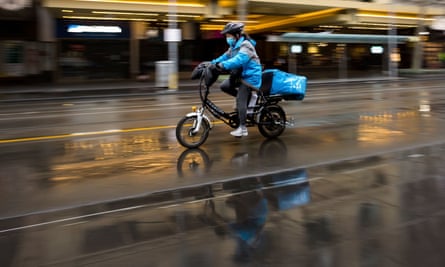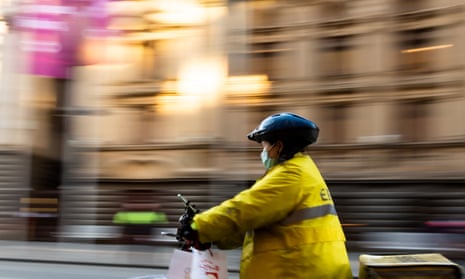Food delivery companies such as Uber Eats do not check whether their delivery riders have working bikes – or can even ride a bike – before approving them to work, according to multiple workers.
Five delivery riders have been killed in road crashes in Australia since 27 September, an average of one every 11 days. In Sydney, Uber Eats rider Bijoy Paul was killed on Saturday, and another Uber Eats deliverer was killed on Monday.
A spokesman for Uber did not respond on Friday when asked if they knew the identity of the man who died on Monday.
Andre Silva, the manager of Sydney Ebike Rentals, says he has seen many deliverers using poorly maintained bikes where the tyres and brakes are “gone”, because the food delivery companies do not check on their workers’ equipment.
Silva told Guardian Australia he has refused to rent bikes to people approved to deliver food because it was clear they could not properly ride a bike.
“Some riders, they are not a 100% confident riding a bike,” he says.
“Here in the shop we can see them riding, we tell them ‘Hey man, sorry we can’t rent to you. It is dangerous.’ That has happened before. We see the customer has no balance. We say, ‘Sorry, we can’t rent to you.’ It is not easy. You are riding with a big bag, with food. You are likely to get tired after riding for four or five hours.
“If they start the delivery job, and the only thing they have to do is open an account, [the companies] don’t see them riding a bike, so it is hard to tell if they are able to ride a bike.”
Silva says staff at his store, which frequently sells and rents bikes to deliverers, have noticed the poor quality of bikes that their customers were previously using.
“Maybe they are purchasing bikes from people who post bikes on Facebook, without making a proper service on it,” he says. “They do not follow up on maintenance and do not give guidance to riders on how they should ride.
“We have some customers who have rented from someone else, and they don’t have brakes, the tyres are gone.”
“We need more bike lanes of course … Food delivery is increasing a lot, we are having a lot of extra deliverers on the street.”
Bruna Correa, a 26-year-old former deliverer for Uber Eats, says the company never checked whether she had a working bike, whether her bike was in good condition, or if she could properly ride one.
“They didn’t check,” she says. “Mine was OK. But nobody ever checked anything.”
“Before I signed up, they [had] this video about the basics of riding a bike, keep on the left lane, wear a helmet, be careful when it’s raining. It’s just that basically, just a video. It is not really a training.”
Correa, who is from Brazil, says she broke her arm while delivering for Uber Eats during the pandemic, and had to have surgery on the injury.
“It was the only job I could get because it was the beginning of the lockdown,” she says. “I didn’t have any experience on bikes. I never rode bikes on the street. [Whenever] I rode bikes it was somewhere not very far.
“I was pretty nervous when I started. In the beginning I didn’t really know what to do.”
Mariano, another Uber Eats rider in Sydney, says the company did not check on the condition of his bike – either before he started or during his work.
Guillerme, a Deliveroo rider in Sydney from Brazil, says the company’s safety training involved telling riders about road laws.
“You have to study all the safety laws,” he says. “For example, you cannot ride on the footpath, you cannot cross a red light of course. Basic things, use the front lights, the rear lights. Stay behind the cars.
“There is no need to have experience riding bikes.”
An Uber spokesman did not answer questions about whether the company checked riders’ bikes or their ability to ride a bike before approving them to work.
“Delivery partners provide their own vehicle,” he said.
He said the company provided bike riders with safety videos and wet weather riding tips.
“During the onboarding process, bicycle delivery partners are required to complete a safety module, which consists of a series of videos and a state-specific knowledge check that has been developed in partnership with Bicycle Queensland. It is a requirement to complete this test annually, and access to delivering with Uber Eats is restricted until delivery partners do so.”
A spokeswoman for Deliveroo also did not answer questions about whether the company checked riders’ bikes or ability to ride a bike before approving them to work.
“As independent contractors, food delivery workers provide their tools of trade, including a mobile phone and mode of transport,” she said.
The company said that the agreement to work “stipulates that their vehicle must meet the roadworthy requirements of the state where they work”.
“As part of the onboarding process all riders must complete health and safety online learning modules according to their nominated vehicle type,” it said. “The modules include safety videos for motorised vehicles and bicycles and road safety information relevant to their location … We believe we offer the most comprehensive onboarding process.”

A spokeswoman for Door Dash declined to answer any questions. She said the company was “committed to helping ensure a safe and healthy work environment for Dashers”.
Uber Eats rider Guillerme says the companies should pressure the government to strengthen protections for cyclists.
“They could involve the government to put some laws on the roads, drivers for example can respect us more,” he says.
“Most of the time, it is not us. The cars, especially the trucks, do not respect us. If you go over to Marrickville, it is full of trucks over there, they don’t respect you. Most of the time, we are in danger because of them.”
Silva says drivers need to be more respectful of cyclists.
“The number of riders is increasing a lot,” he says. “The car drivers are not that used to it and we don’t have enough bike lanes. Maybe the city is not 100% prepared for it.”
